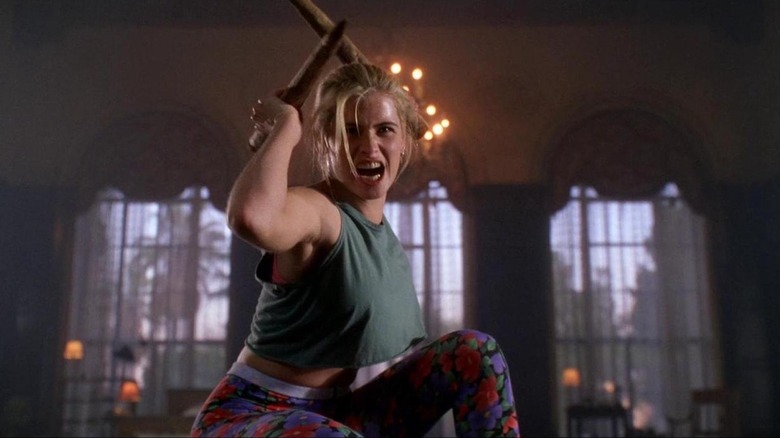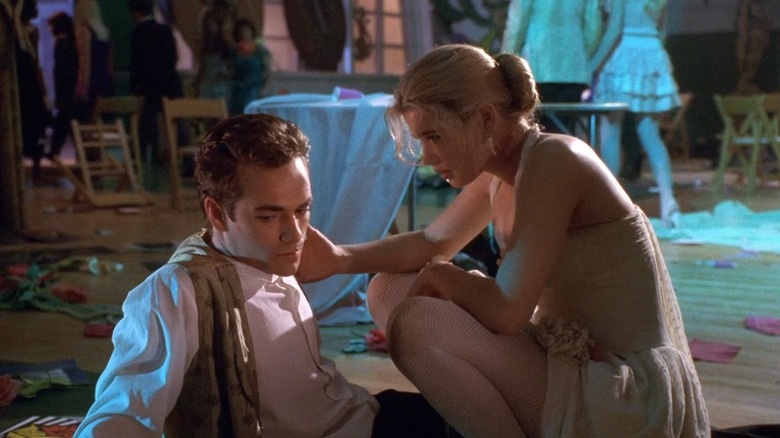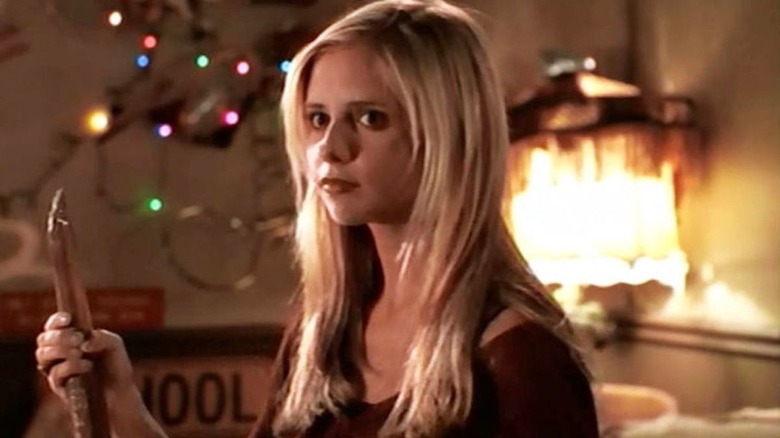Year Of The Vampire: Buffy The Vampire Slayer The Movie Gave Us The First Draft Of Buffy Summers
(Welcome to Year of the Vampire, a series examining the greatest, strangest, and sometimes overlooked vampire movies of all time in honor of "Nosferatu," which turns 100 this year.)
"All I want to do is graduate from high school, go to Europe, marry Christian Slater, and die." "Buffy the Vampire Slayer" turns 30 this year! The film, which starred Kristy Swanson as the titular heroine, was written by Joss Whedon and directed by Fran Rubel Kuzui. While not a complete box office flop, the movie did receive mixed reviews upon its release, and has been lambasted by pretty much everyone in the years since. In fact, thanks to the near-miraculous success of the TV show, the film has become a largely forgotten footnote. Whedon famously despised the movie, which turned out quite differently than how he'd intended. The thing is, without the much-maligned 1992 film, the show likely would never have existed.
Full disclosure: I'm a huge "Buffy the Vampire Slayer" fan. I can name every episode in order or even tell which one is on TV within seconds of seeing it. It's what I watch whether I'm happy or sad, and I own multiple overly complicated "Buffy" board games that I'm fond of bullying people into playing. In fact, watching "Buffy" and "Angel" is basically a prerequisite for dating me. While admittedly loving "Buffy the Vampire Slayer" has become complicated, I can't bring myself to love it any less.
The 1992 movie was my introduction to the concept of "Buffy," and as a kid, I adored it. Like most fans of the show, I haven't given much attention to the film over the years, though I did recently give it a rewatch. Honestly, the series isn't the only thing that justifies the movie's existence. It's a campy gem that's actually way more fun than I remembered. Seriously, give it a try. It's better than you've heard!
What it added to the genre
"Buffy the Vampire Slayer" is better than many horror-comedy entries of the '90s, and certainly one of the best vampire-centric ones in general. I wouldn't put it up there with "The Lost Boys" or "What We Do in the Shadows," but if you don't compare it to the show and just enjoy the ride, it's pretty fun! Not only that, but it's also surprisingly funny. Aside from Swanson, the film stars Luke Perry as Buffy's love interest Pike, Donald Sutherland as her Watcher Merrick, Rutger Hauer (epically hamming it up) as Big Bad Lothos, and most importantly, Paul Reubens in his standout performance as Lothos' right-hand vampire, Amilyn. "Buffy" also features future stars such as Hilary Swank, David Arquette, and Ben Affleck, though blink and you'll miss the latter.
Whedon's idea for Buffy came from a place of wanting to put power in the hands of the petite blonde who was always getting killed off in horror movies. The 1992 film does give us a different kind of heroine, though its scant 86 minute runtime hardly allows for her tremendous growth to actually feel earned. However, just because it doesn't totally land, doesn't mean the journey isn't entertaining. Plus, though she was far less developed than the Buffy Summers who had seven seasons to grow, this Buffy helped provide the building blocks for many fantastic female characters to come, not to mention her TV counterpart. Yes, there are issues with this film, but perhaps the real reason fans have been so hard on it for so long is because Whedon was. Undeniably though, the movie's biggest impact on the vampire genre is the show that spun out of it. Whereas the 1992 film unfolds much in the way you might think its title implies, the show transcends not only the label it was given but also TV genres in general.
Buffy The Vampire Slayer's legacy
"Buffy the Vampire Slayer" aired its first five seasons on The WB beginning in 1997, before moving to UPN for its final two. The groundbreaking series ended in 2003. It's pretty wild that a movie largely viewed as a failure managed to rise from the ashes as a massively popular TV show that has lived on for decades after its release. Much of this is probably because most of us can relate to the idea that high school is hell. While everyone hopes to leave those teen experiences in their rearview mirror, we can't help but be shaped by them anyway. However, the show added far more to the vampire genre than relatable characters.
Consider where vampire lore began in film and television vs where it's ended up. The late Anne Rice is largely responsible for making vampires sexy, but it was "Buffy the Vampire Slayer" that really brought that idea into the realm of teen dramas, which led to generations of swoon-worthy vampire romance. Aside from that, the show had so much more time to explore the truly unique heroine the film created with Buffy, and honestly, in the '90s, our choices in that area were kind of limited. It was pretty much just Xena and I mean no offense to the Warrior Princess, but I wouldn't necessarily call her relatable. The show may have technically been a teen drama, but it did and still does resonate with people of all ages because its themes are timeless. "Buffy" not only seamlessly blended genres but also altered expectations of what TV was capable of. When viewed through a 2022 lens, it can be easy to forget just how influential it actually was.
In many ways, "Buffy the Vampire Slayer" completely changed the television landscape. The show may have used monstrous metaphors to explore real-world situations, but it always grounded those fantastical occurrences in very human emotions. Also, during a time when TV shows were mostly episodic, the series helped to popularize serialized storytelling. The show's famous "Buffyspeak" even influenced the way people talked. It's often tricky when adults write for teens, so the show sidestepped this by creating a language all its own.
While the movie isn't considered canon, it almost seems like something of a rough draft of what the series would later accomplish and it's fascinating to imagine what would've happened if Whedon had gotten the movie he actually wanted. Would "Buffy" have flopped anyway and disappeared without a trace? If it was a success, would Whedon still have jumped at the chance to see his vision fully realized on the small screen? Of course, we'll never know, but without this first iteration of "Buffy," we likely never would've seen Sarah Michelle Gellar in her most iconic role.


